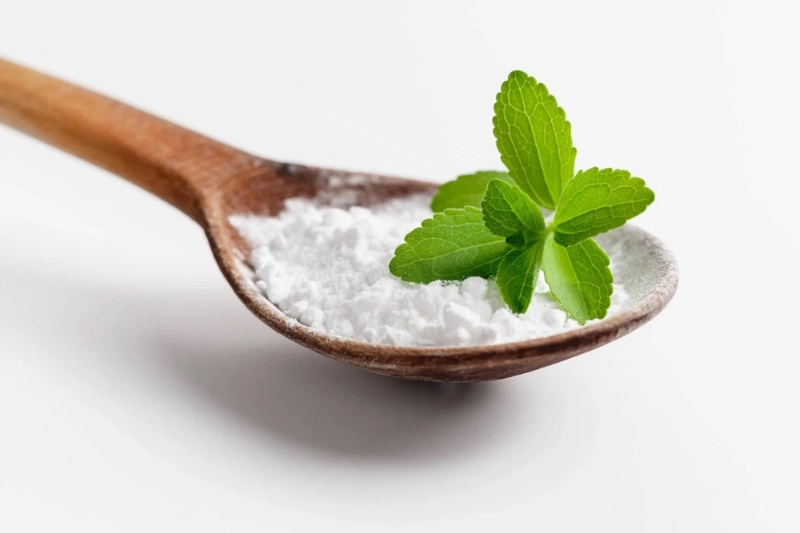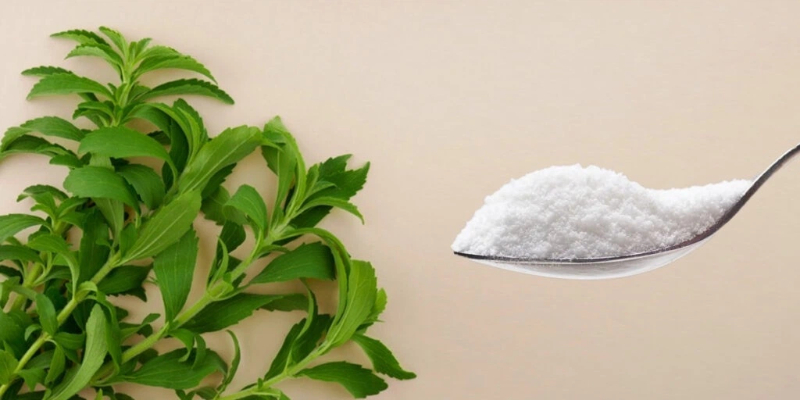Views: 222 Author: Sara Publish Time: 2025-09-22 Origin: Site








Content Menu
● Introduction to Stevia Sweetener
● What is Stevia Leaf Extract?
● Is Stevia Leaf Extract an Artificial Sweetener?
● How Stevia Compares to Artificial Sweeteners
● Applications of Stevia as a Sweetener
● Safety and Regulatory Status
● Health Benefits Beyond Sweetening
● Taste Profile and Improvements
● Future Trends and Industry Applications
● Frequently Asked Questions (FAQs)
>> 1. Is stevia leaf extract natural or artificial?
>> 2. Does stevia leaf extract contain calories?
>> 3. Can stevia leaf extract be used for baking?
>> 4. Is stevia safe to consume?
>> 5. How sweet is stevia compared to sugar?
Stevia leaf extract is a popular sweetener derived from the leaves of the Stevia rebaudiana plant, native to South America. It is widely used as a sugar substitute because it is hundreds of times sweeter than regular sugar yet contains zero calories. Unlike many artificial sweeteners synthesized in labs, stevia originates from a natural source, making it attractive to consumers seeking natural sweetness alternatives.
The word "sweetener" covers a broad category of ingredients used to impart sweetness to foods and beverages. Under this broad umbrella fall natural sweeteners like honey and maple syrup, artificial sweeteners such as aspartame and sucralose, and natural non-nutritive sweeteners like stevia leaf extract. This article explores whether stevia leaf extract should be considered an artificial sweetener.

Stevia leaf extract contains compounds called steviol glycosides—mainly stevioside and rebaudioside A—that provide intense sweetness. These compounds are extracted and purified from the raw stevia leaves through water or food-grade alcohol extraction processes. The purified extracts can be 200 to 350 times sweeter than sugar. The extract is heat-stable, pH-stable, and suitable for baking and cooking without losing sweetness.
Unlike crude stevia leaves or raw extracts, highly purified stevia extracts meet regulatory standards for use in foods and beverages in many countries including the USA and the European Union. The purification process removes most of the bitter aftertaste often associated with unrefined stevia leaves.
The classification of stevia leaf extract often confuses consumers because, although it comes from a natural plant, the final product undergoes significant processing.
- Artificial sweeteners are generally understood to be chemically synthesized compounds not found naturally in plants but designed to mimic the taste of sugar. Examples include aspartame, saccharin, and sucralose.
- Stevia leaf extract, on the other hand, is derived from a natural plant source but purified and processed to isolate the sweet compounds (steviol glycosides).
Therefore, while stevia leaf extract is not an artificial sweetener in the strictest sense, it is also not simply a natural raw sweetener. It occupies a middle ground as a natural non-nutritive sweetener or naturally derived sweetener because it is plant-based but highly refined before use.
| Aspect | Stevia Leaf Extract | Artificial Sweeteners |
|---|---|---|
| Source | Natural plant (Stevia rebaudiana) | Chemically synthesized |
| Sweetness Intensity | 200-350 times sweeter than sugar | Varies, often hundreds of times sweeter |
| Calorie Content | Zero calories | Zero or very low calories |
| Processing | Extracted and purified from leaves | Synthesized chemically in labs |
| Taste Profile | Slightly licorice or bitter aftertaste possible | May have chemical aftertaste |
| Regulatory Approval | Approved in many countries for purified extracts | Approved in many countries |
Stevia leaf extract is used extensively in the food, beverage, and healthcare industries. It is common in:
- Sugar-free and diet sodas
- Low-calorie juices and flavored water
- Dairy products like flavored yogurts and ice creams
- Baked goods requiring heat-stable sweeteners
- Tabletop sweeteners for home use
Its zero-calorie nature makes it popular among consumers managing weight, blood sugar levels, or calorie intake. Stevia's ability to stay stable when heated differentiates it from some artificial sweeteners and makes it versatile for food manufacturing.

Regulatory agencies such as the U.S. FDA and European Food Safety Authority classify high-purity stevia extracts as generally recognized as safe (GRAS) when used within established acceptable daily intake (ADI) levels. However, crude stevia leaf and unrefined extracts lack FDA approval for food use in the U.S.
The safety profile of stevia sweeteners is well-documented, and extensive studies show no significant adverse health effects when consumed within recommended limits.
Stevia leaf extract offers more than just sweetness. Scientific research indicates multiple potential health benefits attributed to steviol glycosides and other plant components.
Studies on diabetic animal models have shown that stevia consumption can help regulate blood sugar and insulin levels, making it a promising sweetener for individuals managing diabetes. It has been observed to improve glycogen storage while lowering blood glucose in such contexts.
Antioxidant properties of stevia extracts have been demonstrated in laboratory studies, where stevia was found to reduce oxidative stress by decreasing free radicals and enhancing the activity of antioxidant enzymes like superoxide dismutase and catalase. These effects may contribute to overall cellular health and protection against inflammation.
Stevia also shows potential antimicrobial effects. Research has revealed that stevia extracts can inhibit the growth of certain pathogenic bacteria, including some responsible for tooth decay and oral infections. This property suggests stevia could contribute to dental health by reducing plaque formation and bacterial proliferation.
Immunomodulatory properties of stevia compounds have been identified, suggesting that stevia may positively influence immune responses by reducing pro-inflammatory cytokine production and enhancing both humoral and cellular immunity. These findings open possibilities for stevia's use in managing inflammatory and immune-related conditions.
Ongoing studies are exploring stevia's potential benefits in areas such as obesity, hypertension, liver protection, and even cancer cell inhibition. While most of this evidence arises from laboratory or animal studies, it highlights stevia's expanding role beyond merely being a sweetener.
Although highly purified stevia extracts have much reduced bitterness compared to raw stevia leaves, some consumers still detect a mild licorice or bitter aftertaste. To address this, manufacturers use various strategies including blending steviol glycosides, fermentation, encapsulation, and combination with flavor enhancers or other sweeteners. Such methods aim to improve palatability and replicate the sensory profile closer to sugar.
Modern processing techniques and selective breeding of stevia varieties also contribute to creating better-tasting stevia-based sweeteners. These technological advances support stevia's wider acceptance and application in diverse food and beverage products.
The global demand for natural, zero-calorie sweeteners continues to grow, driven by consumer preference for healthier alternatives amid rising concerns about sugar and synthetic sweetener intake. Stevia leaf extract plays a pivotal role in this shift by providing a plant-based, sustainable option.
Food manufacturers incorporate stevia into a broad range of products—from carbonated drinks to nutritional supplements—often as part of mixed sweetener systems combining small amounts of sugar or other sweeteners to optimize flavor and texture.
In healthcare, stevia's potential benefits in metabolic health and immune modulation create opportunities for functional food and nutraceutical formulations.
As research advances and production techniques improve, stevia's market presence is expected to expand with new applications focusing on both health benefits and sensory quality.
Stevia leaf extract is a naturally sourced sweetener derived from the Stevia rebaudiana plant, distinct from synthetic artificial sweeteners. While it undergoes processing to isolate and purify the sweet compounds, it retains its natural origin. As a zero-calorie, high-intensity sweetener, stevia leaf extract offers a natural yet processed alternative to sugar and artificial sweeteners. Beyond sweetness, stevia exhibits promising health benefits including antioxidant, antimicrobial, anti-inflammatory, and metabolic effects supported by scientific research. Its widespread use in the food, beverage, and healthcare industries underscores its value as a natural sweetener rather than an artificial one.

Stevia leaf extract is a natural sweetener derived from the stevia plant but is highly processed to isolate the sweet components. It is not an artificial sweetener.
No, purified stevia leaf extract has zero calories because the body cannot metabolize the steviol glycosides.
Yes, stevia is heat-stable and can be used in baked goods without losing sweetness.
Yes, stevia leaf extract is considered safe by major regulatory agencies when used within recommended intake limits.
Stevia leaf extract is approximately 200 to 350 times sweeter than table sugar.
[1](https://pmc.ncbi.nlm.nih.gov/articles/PMC8600158/)
[2](https://www.sciencedirect.com/topics/agricultural-and-biological-sciences/stevia)
[3](https://connect.mayoclinic.org/discussion/new-study-with-stevia-leaf/)
[4](https://pmc.ncbi.nlm.nih.gov/articles/PMC4890837/)
[5](https://www.sciencedirect.com/science/article/abs/pii/S187140212400153X)
[6](https://www.news-medical.net/news/20240122/Sweetener-Stevia-does-not-alter-gut-microbiota-composition-confirms-new-study.aspx)
[7](https://www.webmd.com/food-recipes/what-is-stevia)
[8](https://www.medicalnewstoday.com/articles/319837)
